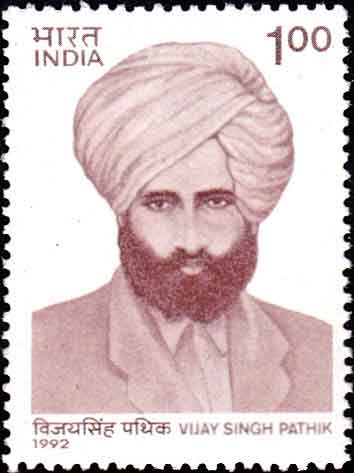
Vijay Singh Pathik (1882-1954) was an eminent freedom fighter, peasant leader, journalist, poet, author, educationist and historian who worked tirelessly all his life to fight both imperialism and feudalism at several levels.
At one level he was active in the Indian National Congress, fulfilling important responsibilities in Rajasthan in particular but also in other areas. However he had started life as a revolutionary of the Gadar Party and remained in touch with the later revolutionary movements also for some time. Thus he was a distinguished example of those freedom fighters who had been active in both streams of the freedom movement. However he is best known for his long struggle against feudal forces—the jagirdars allied to colonial rulers—as a leader of the peasants movement centered in Bijoliya Jagir in Central Rajasthan.
Pathik’s original name was Bhoop Singh and he was born in 1882 in a family of freedom fighters in present day Bulandshahr district of Western UP. His grandfather had sacrificed his life in the great 1857 uprising, while his father too was involved in freedom struggles. Inspired by them, he got in touch with revolutionaries of Gadar Party and he was assigned the task of leading the revolt in Rajasthan. Available accounts suggest that he had succeeded to a remarkable extent, mobilizing many fighters in his base close to Ajmer, but as the overall revolt collapsed due to prior information reaching the British, he had to hastily disband his force. Bhoop Singh now became Vijay Singh Pathik, although out of respect some people also called him Rashtriya Pathik. He was arrested but managed to escape and continued his wanderings.
At this stage he came in contact with Sadhu Sitaram Das, a leader of peasants who invited him to guide the peasant movement in Bijoliya. Peasants here had been suffering immensely from over-taxation—there was even a tax to be paid at the time of daughter’s marriage although the tradition has been to help on such occasions.
Pathik excelled in this new role, drawing wider attention to the problems of peasants with his writings and improving the organizational base by setting up the Bijolia Kisan Panchayat with the help of other leaders. The movement broadened as better awareness about its activities led to similar awakening in other jagirs which faced similar problems. While this could be seen more clearly in nearer areas like Bhinder, Begun, Parali snd Basi, the impact also reached further away in Alwar and Bharatpur. Pathik also met senior Congress leaders like Lokmanya Tilak and Mahatma Gandhi to keep them well-informed about these problems. There was a lot of repression in Bijoliya which sometimes took very cruel forms. However the people continued their movement, while changing tactics from time to time. Finally an agreement was reached in 1922 which reduced the excess taxation and practices like forced labor to a significant extent.
However at the same time to prevent a larger awakening highly repressive action was taken next year in Begun, leading to 11 deaths and mass arrests. Pathik reached here also and towards the end of the year a compromise agreement was reached.
With his growing popularity Pathik was becoming a thorn in the eyes of the colonial rule as well as feudal forces, and he was soon arrested. He came out of the jail in 1928. He went to Kanpur for some time to work with Ganesh Shankr Vidyarthi, the eminent Congress leader of UP who had emerged as a link between the mainstream freedom movement and the revolutionaries. Pathik wrote extensively in his newspaper to draw attention to the problems of people living in princely states and he soon became an important spokesperson of the Praja Mandals that were fulfilling a role similar to the Congress in these princely states.
It is remarkable indeed that in the middle of this he also found the time to start and edit newspapers and periodicals. As these were mainly concerned with opposing feudal and colonial forces, some of these ventures did not last for long but still made an important contribution to the freedom movement. He wrote several poems and songs, some of which became very popular with freedom fighters, as well as plays and inspiring stories. He contributed detailed essays on republics in ancient India. While his most inspiring work was in Rajasthan, in his later years his stay in Kanpur and Mathura also brought him back to some activities in UP where he was born. He breathed his last in 1954.
A postage stamp was issued in his name and several places are named after him, but clearly there is need to spread more awareness about the ideas and work of Pathik who contributed so much in several diverse ways for the cause of freedom, justice and an exploitation-free society.
Bharat Dogra is known for his book and booklets on freedom movement, the latest being When the Two Streams Met and Azadi Ke Deewanon Kee Daastaan.
Related posts:
"freedom" - Google News
July 30, 2022 at 01:08PM
https://ift.tt/PEc36vN
Vijay Singh Pathik—the Tireless Freedom Fighter Who Fought Both Imperialism And Feudalism - Countercurrents.org
"freedom" - Google News
https://ift.tt/qnRxj58
https://ift.tt/anBINgb
Bagikan Berita Ini














0 Response to "Vijay Singh Pathik—the Tireless Freedom Fighter Who Fought Both Imperialism And Feudalism - Countercurrents.org"
Post a Comment